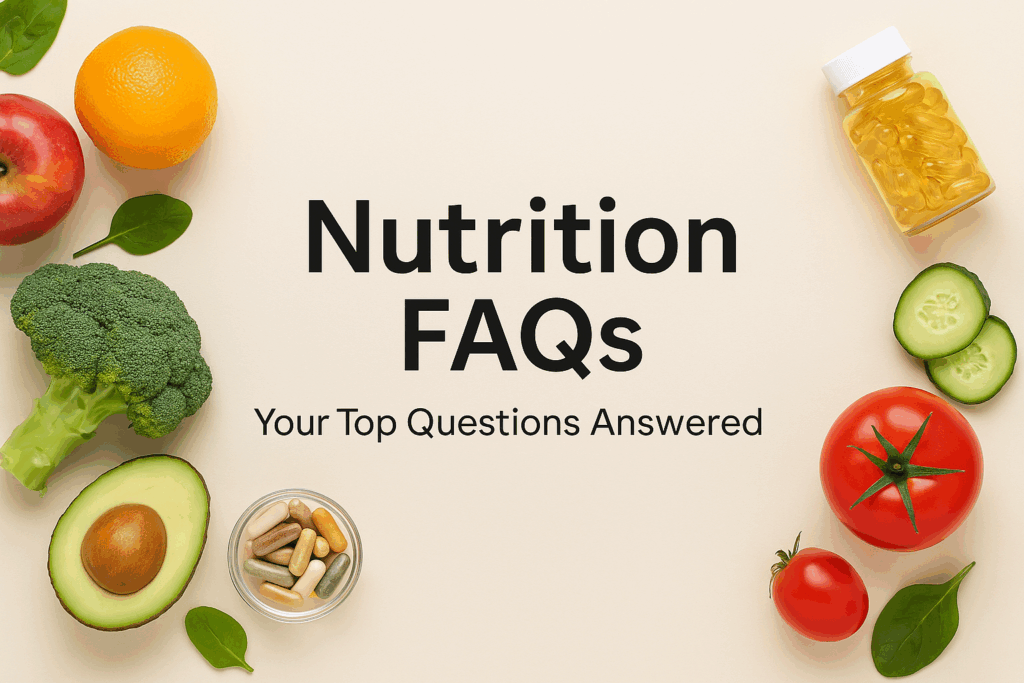Nutrition FAQs
Is organic produce better than non-organic options?
Organic produce often has fewer pesticide residues, and farming practices tend to be more environmentally friendly. However, there’s no strong evidence that it offers significant nutritional advantages over conventional produce. If you can afford organic, it may reduce exposure to pesticides—but thoroughly washing all produce under running water is effective for reducing residue and removing bacteria. The most important thing is to eat more fruits and vegetables, aiming for at least 5 servings per day.
Do I need to take a multivitamin or supplements?
If you eat a balanced and varied diet that includes protein, fruits, vegetables, healthy fats, whole grains, dairy, beans, and fish, multivitamins aren’t necessary. However, certain individuals (e.g., those low in vitamin D, calcium, or iron) might benefit from supplements. Always consult your physician or a registered dietitian before starting any new supplement.
What diet helps me lose weight the fastest?
There is no universal “fast” diet that produces long-term results. Overly restricting calories often leads to rebound or emotional eating. The most sustainable approach to weight loss combines balanced eating with regular exercise—calories in and calories out.
What “bad foods” should I avoid?
I prefer not to label foods as “bad.” However, overconsuming any food—even nutritious ones—can be problematic (for example, eating too many bananas can raise blood sugar). Aim for balance by including protein, whole grains, fruits, vegetables, and healthy fats in your meals. Occasional treats are fine but should not be part of your everyday diet.
How much protein should I eat?
The standard recommendation is 0.8 grams of protein per kilogram of body weight per day. For a 180-pound (82 kg) individual, that’s about 65 grams per day. Those aiming for weight loss or who are active may benefit from 1.0–1.5 grams per kilogram. Consistently consuming more than 2 grams per kilogram or 0.9 grams per pound may risk digestive issues, kidney stones, kidney damage, bone loss, and cardiovascular stress. Always check with your medical provider or a registered dietitian for personalized guidance.
Should I fast or skip meals to lose weight?
Intermittent fasting may yield short-term weight loss but doesn’t guarantee long-term success. Our bodies need regular energy from carbohydrates, protein, and fats. Skipping meals can disrupt metabolism and lead to overeating later. Opt for balanced, regular meals instead.
Why is eating healthy so expensive?
Whole and unprocessed foods—such as beans, grains, vegetables, seasonal produce, dairy, and lean meats—can be more affordable than fast or processed meals over time. For example, a fast-food combo may cost around $14–16, while a homemade meal like chicken fajitas might be closer to $10–11 per serving. Focusing on seasonal and sale-priced items helps you save money now and potentially on future healthcare costs.
Are carbohydrates bad for me?
No—carbohydrates are your body’s preferred energy source. The key issue is usually portion size and meal balance. Pair carbs with protein, vegetables, and healthy fats, and choose whole grains or fruits over sugary snacks. Moderation and balance are what matter most.
Final Takeaways:
-
Focus on variety and balance
-
Prioritize whole, unprocessed foods
-
Wash all produce for safety
-
Consume protein aligned with your activity levels
-
Avoid extreme restrictions, and choose habits you can sustain
